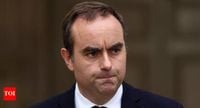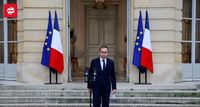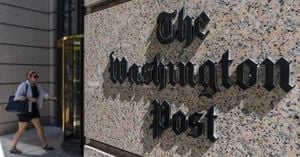French President Emmanuel Macron has once again turned to Sebastien Lecornu to navigate France through a period of deep political uncertainty, reappointing him as prime minister on October 10, 2025, just four days after Lecornu’s abrupt resignation. The Élysée Palace’s late-night announcement capped a week of high-stakes negotiations and shifting alliances, as Macron’s administration struggled to maintain stability in the wake of a snap election that left parliament fractured and the government’s future in limbo.
Lecornu’s reinstatement follows a dramatic sequence of events that began with his resignation on October 6—less than a month after he first took office and only 14 hours after presenting his new Cabinet. His resignation was prompted by the immediate rejection of his Cabinet by a key coalition partner, a move that deepened France’s ongoing political crisis and sparked calls from opposition parties for Macron himself to step down or dissolve parliament. According to Associated Press, Macron ignored these demands, instead promising to name a new prime minister within 48 hours. After days of backroom discussions and meetings with party leaders, Macron ultimately decided to bring Lecornu back, tasking him with forming a new government and preparing a national budget to break the deadlock.
In a statement posted to social media, Lecornu acknowledged the gravity of the situation, declaring that he accepted the position "out of duty" and would "do everything possible to ensure France has a budget by the end of the year and to address the daily concerns of our fellow citizens." He stressed the urgent need to resolve the political crisis that has "exasperated the French people" and damaged France’s image and interests, emphasizing that success would require comprehensive parliamentary debate and legislative responsibility. "We must put an end to this political crisis that exasperates the French and to this bad instability for France’s image and its interests," Lecornu wrote, echoing the sense of fatigue and frustration felt by many in the country.
Macron’s decision to reappoint Lecornu was met with immediate and fierce criticism from across the political spectrum. Left-wing France Unbowed (LFI) coordinator Manuel Bompard lambasted the move as a "new slap in the face to the French people from an irresponsible man drunk on his own power." Meanwhile, far-right National Rally leader Jordan Bardella denounced the reappointment as a "democratic disgrace," accusing Macron of being "isolated and disconnected" from public sentiment. Bardella vowed that his party would "immediately of course censure this coalition which does not have any future" by introducing a no-confidence motion in parliament, as reported by BFMTV and Associated Press.
Political observers, speaking to Associated Press, noted that Macron’s reappointment of Lecornu highlighted the president’s limited options and the fragility of his centrist bloc. The 2024 snap election had produced a hung parliament, with significant gains for far-right parties and no clear majority for Macron’s allies. This left the president unable to push through his reform agenda and exposed his government to repeated challenges from both opposition and disaffected members of his own camp. Leaders from various parties who met with Macron for more than two hours on the day of Lecornu’s reappointment admitted they left the meeting uncertain about the president’s next steps. Marine Tondelier, leader of the Ecologists party, questioned Macron’s leadership style, remarking, "How can one expect that all this will end well? The impression we get is that the more alone he is, the more rigid he becomes."
Lecornu faces a daunting set of challenges as he attempts to form a government capable of commanding support in the National Assembly. Chief among these is France’s mounting fiscal crisis. The country’s budget deficit stands at 5.8% of GDP, one of the highest in the European Union, while public debt has soared to €3.346 trillion ($3.9 trillion), or roughly 114–115% of GDP as of the first quarter of 2025. The poverty rate has also climbed to 15.4% in 2023, its highest level since records began in 1996, according to the national statistics institute. These economic pressures have triggered alarm among investors, credit rating agencies, and the European Commission, which has called on France to meet EU debt limits and restore fiscal discipline.
Lecornu has made it clear that restoring France’s public finances will be a top priority for his administration. "Restoring France’s public finances will remain a priority," he stated, warning that "no one will be able to evade this necessity." He also outlined several key conditions for those wishing to join his government. Ministers must agree to abandon any ambitions to contest the 2027 presidential election, a move intended to foster unity and prevent internal power struggles. Additionally, Lecornu emphasized the need for "renewed expertise and diversity" in his Cabinet, signaling a desire to bring in fresh perspectives and a broader range of skills to confront France’s complex challenges.
Lecornu’s political career has been marked by rapid ascension and a reputation for crisis management. At 39, he became France’s youngest defense minister, leading a major military modernization plan through 2030. Originally a conservative, he joined Macron’s centrist movement in 2017 and has since held several key government roles, including stints in local administration and overseas territories. During Macron’s "great debate" following the yellow vest protests, Lecornu played a pivotal role in mediating public anger through dialogue. In 2021, he led talks on autonomy in Guadeloupe amid civil unrest, demonstrating his ability to navigate sensitive political terrain.
The reappointment of Lecornu marks the fifth time in less than two years that France has seen a new prime minister, reflecting the volatility and rapid turnover that have come to define Macron’s second term. Successive minority governments have collapsed with increasing frequency, leaving Europe’s second-largest economy paralyzed by political instability. This has not only undermined France’s standing on the international stage but also contributed to a sense of disillusionment and frustration among ordinary citizens.
As Lecornu sets about forming a new government and preparing a budget, the stakes could hardly be higher. The coming weeks will test his ability to unite a deeply divided parliament, restore public confidence, and chart a course out of the current crisis. While his commitment to duty and reform is clear, the scale of the challenges facing France means that success is far from guaranteed. Whether Lecornu can deliver on his promises and stabilize the country remains to be seen, but for now, his reappointment offers a glimmer of hope amid the uncertainty.
France stands at a crossroads, with its political and economic future hanging in the balance. The choices made in the days and weeks ahead will shape not only the fate of Macron’s presidency but also the trajectory of the nation itself.






